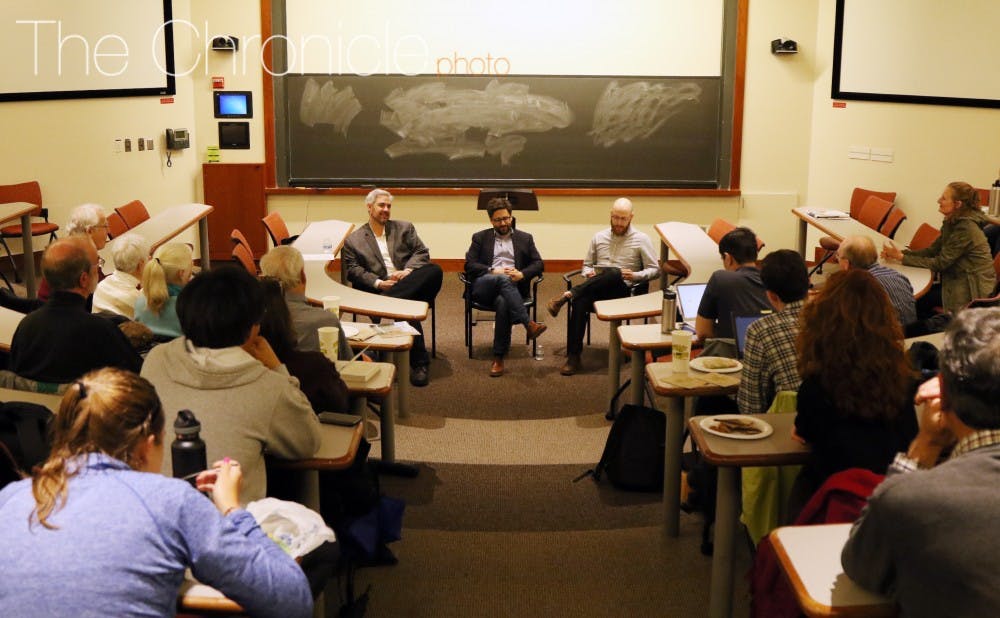On October 28, 2016, James Comey, the director of the Federal Bureau of Investigations, sent a letter to Congress informing them that he had reopened an investigation into Hillary Clinton’s emails—the biggest story of the day in politics.
For New York Times journalist Matt Apuzzo, the news struck on his day off. He was at the top of the Empire State Building with his seven-year old when he got a call from fellow Times journalist Adam Goldman about the situation.
“People talk about Comey ruining the campaign, but Jim Comey ruined my day with my kid,” Apuzzo said.
Goldman and Apuzzo—who won a Pulitzer Prize in 2012 for their reporting on the New York Police Department’s practices of spying on the Muslim community—discussed their prize-winning work on surveillance and their coverage of the 2016 election Monday at Duke.
The talk occurred one day after their 8,000 word story on Comey’s sway over the election splashed across the front page of the New York Times.
At the event held in the Sanford School of Public Policy, the duo shared personal anecdotes about their Oct. 28 story that followed Comey’s letter in which they linked the reopening of the Clinton file to an investigation into Anthony Weiner’s illicit messages with an underage North Carolina girl.
The seeds of October’s front-page story had been planted long before Comey’s letter to Congress when Goldman heard from a source that Weiner—a former Democratic congressman from New York and the husband of a top Clinton aide—was being investigated. By the time Apuzzo was on the elevator down from the Empire State Building, he was already planning to make calls to find a second source for the information.
“So then I said to my seven-year old, ‘Do you want to see the New York Times building? See where Dad works?’ So we go to the New York Times, and I’m working the phones as I’m walking through, and all the editors are saying that they need a second source. While I’m there, we get the second source, so my boss pulls me into a room, where Goldman is on a conference call with the editors,” Apuzzo recounted. “One of the editors takes my seven-year old and says, ‘So, you want to see the vending machines?’”
After Apuzzo wrote his portion of the story, he said he turned around to see his kid with a Coke and a giant bag of Cheetos.
“He was happy as a clam,” Apuzzo said.
Both reporters said there was no way to not cover something so newsworthy and public.
“Nobody is going to not lead the paper with that,” Apuzzo said.
Goldman quipped that “it’s news,” and Apuzzo followed up to say that it would have been “ridiculous” if the incident had not been a leading story.
The pair shared their experiences with other big news stories from the election cycle. Apuzzo noted that they did not know about infamous Trump dossier—alleging that the Russian government had been assisting Trump for years—until Buzzfeed News published it.
“As the FBI reporter, you would think that someone would have told me about the freaking dossier, right?” Goldman joked.
Goldman admitted that he may have been distracted by the preliminary investigation into the Clinton Foundation because Clinton was the strong frontrunner.
When asked by an audience member about the effects of Trump’s attitudes toward the press and his labeling journalism “fake news,” Apuzzo said this is nothing close to the “chilling effect” that the Obama administration’s crackdown on journalists and leaks had on the profession.
Courtesy of the previous administration—which Apuzzo called the “most oppressive [for journalists] since Nixon”—Goldman and Apuzzo both had three months of their phone records seized. Goldman said he will “give Trump the benefit of the doubt,” and Apuzzo noted that the current president is “not calling us criminals."
“I’ll take the guy saying we’re fake news,” Apuzzo said.
Get The Chronicle straight to your inbox
Signup for our weekly newsletter. Cancel at any time.
Bre is a senior political science major from South Carolina, and she is the current video editor, special projects editor and recruitment chair for The Chronicle. She is also an associate photography editor and an investigations editor. Previously, she was the editor-in-chief and local and national news department head.
Twitter: @brebradham
Email: breanna.bradham@duke.edu

